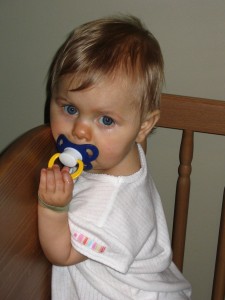Sometimes It’s About the Less-Bad Option

I keep trying to write this post, and keep deleting it.
In fact, I started to write this post over a year ago. This time I’m determined to actually publish it!
Here’s why: This post is about….sleep training (gasp!).
People are so incredibly polarized on this issue, and I can completely understand why.
I get it. I really do.
On the one hand, some people are of the mindset that sleep training may hinder a child’s emotional development or attachment with his or her parents, that allowing a child to cry causes undue stress on the child, and that when a baby cries during sleep training he or she is doing so because they feel abandoned.
Often these same people will say that self-soothing in babies is a contrived notion, and that it’s our job as parents to meet their every need (including helping them fall asleep). That they will eventually learn these skills on their own. That they will not be ’16 and still needing to be rocked to sleep’.
I imagine that those who take this view feel they are defending the defenceless.
Then there are others who believe that some babies need to be taught self-soothing. That babies or toddlers who aren’t getting enough sleep are at risk for sleep issues later in life, or worse yet, learning delays or conditions like ADHD.
These parents generally wouldn’t say they enjoy sleep training, and probably wouldn’t choose it if they felt they had any other choice.
The common ground?
Parents on both sides of the issue feel they are doing what’s best for their baby.
My Experience With Sleep Training
 Writing as someone who has done sleep training with one of my children and not the other, I can most definitely see both sides of the issue.
Writing as someone who has done sleep training with one of my children and not the other, I can most definitely see both sides of the issue.
My daughter (now 9) was notorious for fighting naps. And I mean really, really fighting.
She was an extremely alert, active baby, and never wanted to miss out on anything. She didn’t particularly appreciate cuddling, and in fact, when she got fussy, she was more likely to settle when you put her down.
For a number of months, I was able to soothe her to sleep at nap time by rocking her.
After a while however, she started to resist. I would rock and rock and rock her, but she would just get more and more agitated.
I would have done ANYTHING to get her to sleep. Like literally, anything.
She wouldn’t fall asleep in the car, in the stroller, in the sling, in my arms, in my bed. Seriously. From the time she was about 6 weeks old until she was 13 months old, she didn’t fall asleep ANYWHERE but her crib.
The closest she came was at 10 months old on an almost 24 hour trip – she passed out for 30 minutes on the plane.
Because she wasn’t sleeping during the day, she was extremely grumpy. She was constantly fussing, rubbing her eyes, and was obviously exhausted. I knew she needed to sleep, but had no idea how to help her get it. The lack of sleep during the day was also starting to effect her nighttime sleep.
Finally, I decided the only option left was to do some sleep training. It actually didn’t feel like a decision at all; because I couldn’t find any other way to get her to sleep, it was this or nothing.
Then came my son, the inspiration for this site. So much fussier than Aliya, but loved to cuddle.
From the time he was a couple of months old, I was somehow always able to find a way to get him to sleep.
Sometimes it was the car, sometimes the swing, sometimes having him in my bed. I always knew I could put him in the sling, take a long walk, and he would most likely sleep at least some of the time.
I was able to help him get the sleep he needed.
With my daughter, I was not.
When Sammy was 3 years old, we did some very gentle ‘no cry’ sleep training (for lack of a better term) and apart from still sneaking into our bed from time to time, he’s been a great sleeper ever since.
My Views on Sleep Training
In an interview I did with Dr. Weissbluth when Sammy was about 2, I mentioned how I had never done sleep training with Sammy because he had had to cry too much as a baby, and it was too hard for me to hear him cry anymore.
His response was, “Crying is hard. Sleeplessness is harder“.
I see what he was saying. In terms of Sammy, I respectfully disagree. Yes, he had some problems with sleeping, but I was okay with that.
I didn’t feel like sleep training was right for him, and I liked that I could help him sleep just by laying with him or cuddling him.
With Aliya, this statement hits the nail on the head. Yes, it killed me. KILLED ME, to hear her cry. But having her not sleep was so, so much harder.
So here’s the thing. I don’t LIKE sleep training.
I’d imagine that most parents feel the same way, even those who have done it with success and who don’t regret it.
But sometimes, it’s the less bad option.
Hearing your baby cry feels really, really bad.
But sometimes, having your baby not sleep feels worse – both for him and for you.
Don’t get me wrong. I would never tell a parent that they ‘should’ pursue sleep training. I would never ask a parent to do something they weren’t comfortable with. I would never blame a parent for their child’s sleeplessness because they hadn’t done sleep training.
I’d sympathize, and understand their reasons for not sleep training. Heck, if I lived to close to them, I’d offer to watch their little one so they could take a nap.
I’ve heard from countless parents who’s little ones are taking short, 20 minute naps each and every day, and then waking up to 12 times each night.
The lack of sleep has made them chronically overtired, making it even more difficult for them to fall asleep and stay asleep.
And this is only the effect of sleep deprivation on the baby.
Parents (usually moms) who are consistently getting insufficient sleep are feeling depressed, overwhelmed, and in some cases, barely able to function.
They’re putting on weight because they aren’t able to stay active, which is feeding into their feelings of guilt and shame.
They’re having trouble being patient with their baby, and then are feeling beyond guilty because other moms seem to love being with their kids.
This isn’t anyone’s idea of a good time.
A Psychologist’s View of Sleep Training
My husband and I were talking the other night about sleep training, and why it’s so hard for parents to hear their babies cry.
I’d imagine there’s not a single mom in the world who would revel in the sound of her infant crying.
So why is it SO hard for us to hear our baby cry, even when we know it will be for their great benefit in the future? Why can we not allow them to cry for a short period of time to prevent even more crying (in the way of fussiness as a result of sleeplessness) later on?
My husband (who, it must noted is a Psychologist. I only say this to explain that these are the things he ponders on a regular basis), posited that maybe one reason it’s so hard for us is that in our time and culture, we’re not used to suffering. Sure, we have problems, but in many circumstances, there are ‘quick fixes’ for our problems.
When our baby has an earache, we give antibiotics. When her gums are hurting, we slap on some teething gel. When she refuses to eat her peas, we give her pureed peaches – because that is an option for us.
In short, we’re not used to delayed gratification.
We live in a culture where we’re able to avoid suffering to some extent. To us, suffering isn’t a normal part of life, but is rather something to be avoided at all costs. If we can possibly do something to stop it, we’ll do it.
But is this always the best course of action?
(I’m still chewing on this one. But something interesting to think about).
Sleep Training Around the World
In doing some research recently into sleep training, I wanted to know what other cultures think of the concept. I was surprised to discover that in many non-western cultures, the term ‘sleep training’ isn’t even part of their vocabulary.
I wondered at first how these moms in other cultures did it – Colic happens everywhere, high need babies too. How do they help their children get the sleep they need?
Turns out, there’s one significant difference between our western culture and these other cultures: In many other countries, living in close proximity (sometimes in the same house or even sharing a bedroom) with extended family is the norm.
Baby not sleeping? Let grandma take the night-shift a few times a week.
In some countries, middle class families even have hired help, like nannies or maids who help with the child raising responsibilities.
With rare exceptions, our culture for some reason expects us to do it all alone. We’re supposed to get up 6 times a night with our baby, then get up at 6am to start the day. We’re with our baby ALL day, and then we do it all over again (and again, and again).
This is simply not sustainable.
Sure, many women get through these difficult years without help, and without doing sleep training of any sort.
They get up frequently at night (I’m not talking just once or twice either), and somehow plough their way through. Best case scenario, their little one figures out the whole sleep thing, and eventually everyone gets caught up on sleep.
And to them I say – WOW. You shouldn’t have had to do it all alone, but you did it. You came out the other side and you did what you felt was best. Way to go.
My hope is that all parents would find the compassion to say this, regardless of how their views may differ.
Misconceptions About Sleep Training
I’ve noticed that often, as soon the phrase ‘sleep training’ comes up, any chance of an open and positive dialogue goes out the window.
I think it’s because there’s this notion that sleep training means plopping your baby in the crib and walking away. Hour upon hour, your child screams as you ignore her cries.
Having read pretty much every sleep book out there, having talked with many of the foremost sleep experts, and having worked closely with several infant sleep consultants, I can assure you, this is not an approach that most would suggest.
One mom on our Facebook page recently compared sleep training to dog training. I guess if we’re talking about dog training a la Caesar Milan, I’d agree to a point.
Sleep training, in my opinion, is seriously misunderstood. In my experience, sleep training is far more about teaching parents the fundamentals of infant sleep than it is about ‘forcing’ a baby to do something,
I’d imagine in the past, and still in other cultures today, parents are taught ways to calm their babies and to help them sleep. In our culture, sadly, we’re often missing this.
Good sleep training will teach YOU how much sleep your baby actually needs, how to set the stage for the best possible sleep, and what you should expect (and not expect) of your little one.
Good sleep training will look at your child’s habits and temperament, your parenting style, and work within that to help your child get as much sleep as possible.
I know I sound like I’m seriously pro sleep training. I guess in a way I am.
But more than that, I’m ‘help your child get the most sleep possible, in whatever way you can’.
Sometimes this will mean taking long walks in the stroller every afternoon to ensure a long afternoon nap.
Sometimes it will mean co-sleeping, even if that’s not what you planned to do.
And sometimes, yes, it will mean giving your baby the gift of learning self-soothing skills.
I’m not pro sleep training, I’m pro sleep.
Whatever it takes to get your baby the sleep he or she needs, do it. Whatever you are able to do, given your current situation, your current mental state, and your access to – or lack of – support, do it.
I will support you.
Other Posts You May Like
New Research Says Cry It Out (CIO) Doesn’t Cause Harm
Wait it Out (WIO) or Cry it Out (CIO): Is This Really the Best We Can Do?
BS Facts About Baby Sleep That Everyone Thinks Are True
Sometimes It’s About the Less-Bad Option
The 9 Causes of Colic, Fussiness, High Need Behaviour and the Spirited Temperament
Is this thing on?
